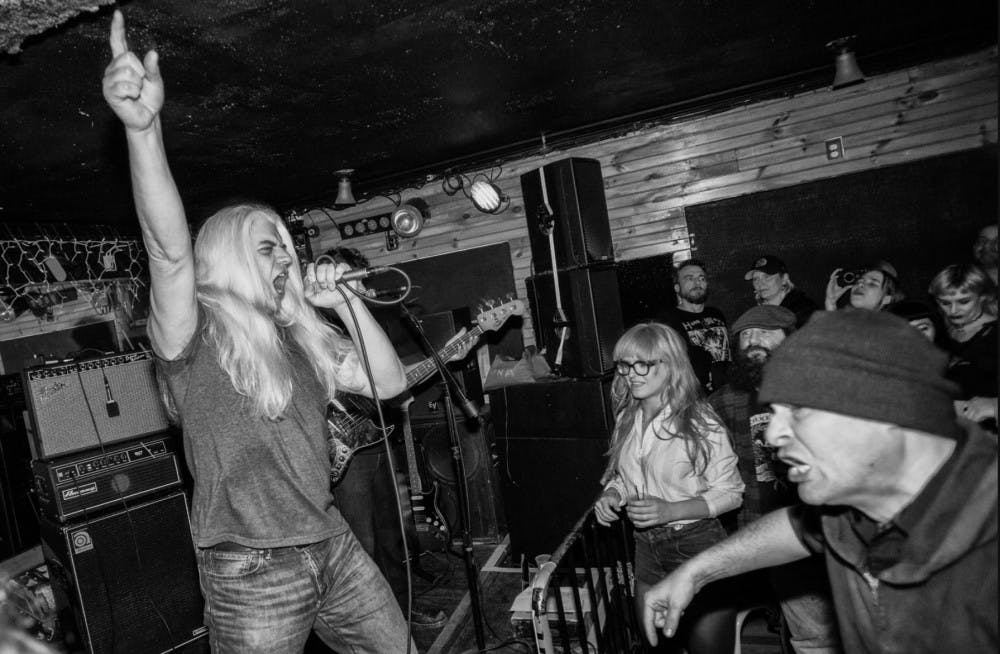Paul Mahern was the only punk rocker in his 5,000-student Indianapolis high school in the late 1970s. He wore a leather jacket and his hair spiked, just like one of his top influences, Sid Vicious, singer and bassist of the Sex Pistols.
Now he has long, flowing white hair and still fronts the punk band he joined in high school, Zero Boys. Mahern will bring his expertise and professional experience in punk to IU students in a new class for fall 2018.
He will teach MUS-Z 320: History of Punk Rock, which starts at the birth of garage rock in the '60s and makes its way to 2018.
“In this class we will investigate what happens when generations of young people choose the electric guitar as a weapon against boredom and a rigged system,” Mahern wrote in the class syllabus.
Mahern said he's been asked several times to write concise definitions of punk and the class, but he said it will take a few years of teaching the course before he can decide how to whittle it down.
He said punk is most centrally about honest self-expression and truthful communication.
“Get a guitar and express yourself," he said. "Expressing yourself and telling your truth, scream it with an electric guitar, that’s punk. If what you’re saying is real to you, that’s punk.”
This class will add to the music history courses Jacobs School of Music offers in the Music in General Studies program, which includes MUS-Z 201-203: History of Rock ’n’ Roll Music I-III, MUS-Z 200: History of the Blues, MUS-Z 393: History of Jazz and artist, genre and era-specific classes.
Mahern has been teaching MSCH-P 353: Audio Production in the Media School for nine years, while also working 40 hours a week in his Bloomington studio. He stills works with Indiana and local bands, including John Mellencamp.
The Indianapolis Star put Mahern at No. 15 in the top 25 Indiana musicians of all time.
Mahern hadn’t considered teaching a punk class until he was approached by current music professors Glenn Gass and Andy Hollinden, who wanted to add more courses to the Music in General Studies program.
Mahern started piecing together playlists, which would eventually constitute each class.
As of now, the class begins with the Trashmen, Lesley Gore, 13th Floor Elevators and the Velvet Underground, among others.
“As soon as you start having a discussion with your peers, my punk rock peers, they’re immediately, they’re like, ‘Oh yeah, well, what was the first punk rock song?’, which I think is a boring conversation,” he said.
Once he figured out where to start, he continued breaking down the playlists through time and location.
“It’s like a puzzle,” he said. “You make a playlist, and you kind of develop that one section, and then you realize, ‘Oh no, I need that song from that one playlist in this playlist.'"
The class covers proto-punk in Detroit and Europe, then punk on the East Coast, before settling on a full day for the Ramones between 1976 and 1980.
Then the course expands on the East Coast before bouncing to British punk and a full day of the Sex Pistols.
The Sex Pistols are the epicenter of punk, Mahern said. Everything before was moving toward that and everything after was a reflection.
The rest of the class includes new wave, post-punk, no wave, hardcore and pop punk, with focuses on the Clash, Nirvana, Green Day and the women of punk.
“In today’s world, some people understand that punk is like Hot Topic and Green Day, and you can’t take that away from them,” he said. “Punk has become commercialized, but the underground, basement-dwelling punk rock has continued through all of the commercialization.”
Bloomington in particular has always had and always will have a strong underground music scene, Mahern said.
Indianapolis, though, was not a place where punk thrived as Mahern was growing up. It took him two buses and an hour each way to get to the two record stores in Indianapolis where he would ask the staff for their punk recommendations.
“I’d get home with these records, and they were just like transmissions to another world,” he said. “It really solidified my feeling that recorded music is such a great, beautiful, direct form of communication.”
Mahern talked at length, with stories and examples, about communication and truthful self-expression as the essence of punk.
“Ultimately what I want people to take away from this class is the idea that they can invent themselves in any way, shape possible they want to,” he said. “You can constantly be reinventing yourself and expressing yourself in a real way.”
The class is set to meet 7:15 to 8:30 p.m. Tuesdays and Thursdays.
There is one group of students Mahern particularly wants to take his class, he said.
“I really want Kelley business school students to take this class,” he said. “This is one of my primary focuses because I just think that do-it-yourself ethic of punk rock — starting a fanzine, starting the label, not waiting for some angel investor to come along and help you start your business — I think all of that could be extremely valuable to young business people. And they’ll learn about the magic of music.”




